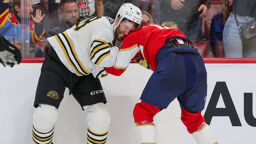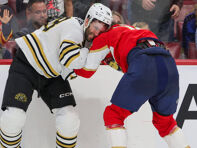By Matt Horner
Brian Burke saved my life.
At a very dark time in my life he stepped forward and opened a door for me that I thought would forever remain closed. With a simple act of loving and accepting his son, Brian Burke gave me the courage to live.
In late 2009, when Brendan Burke publicly announced he was gay, and Brian — the type of guy you would typically expect to not be very gay friendly — extended his love and support for his son, I was 23 years old and still deeply in the closet. I had told one friend I was gay a couple years earlier, but immediately retreated back into the closet, a little less alone and a little less ashamed, but still utterly miserable, scared, and growing increasingly hopeless.
In the ESPN story, when I read Brian as quoted saying, "Of course, we still love you. This won't change a thing," it was like a door was kicked open for me. If a hyper-masculine guy like NHL executive Brian Burke would still love his son, then certainly my friends and family would too. A courage inside me that was so small grew a little bit that day. It slowly grew to the point that a few months later I took my first real step as myself and began telling more of my friends, and eventually my family, the truth.
The story was published at a crucial moment in my life. In the months leading up to Brendan's announcement I was feeling more alone and isolated than I had in my entire life. I was getting to a very dark place and didn't know how much more I could take. I was starting to get a little desperate.
I shouldn't have been feeling this way, of course. The friend I came out to was tremendously supportive and exceedingly sweet and caring as I bawled my eyes out, and we grew closer in that moment. But what should have been the beginning of my life turned into a major step back, in large part due to sports.
Growing up I was a sports fanatic. I played hockey in the winter and baseball and roller hockey during the summer. But since I grew up just outside of Toronto and was a true-blooded Canadian, I really couldn't get enough hockey. OK, I knew I wasn't going to make the NHL playing house league, so I could do without the 6 a.m. practices, but at normal hours I was hockey mad.
Unfortunately, I had a very hard time reconciling my love of sports with my homosexuality. Those two things seemed at such odds. Nothing I had experienced in locker rooms or seen in the media indicated anything different. Sports were for men and gay people weren't really men, at least not the type of men that were worthy of respect. Everything bad was described as "gay" or so and so was a "fag". And those words may as well be the school motto for any high school, so there was no reprieve there. As a result, I didn't respect myself. In fact, for most of my adolescence I actively hated myself.
I had internalized all that ugly homophobia. I was so ashamed I couldn't even acknowledge out loud to myself that I was gay until I was 21.
I quit playing hockey for two years in high school because I didn't feel welcomed playing sports. The general locker room homophobia was suffocating and as I heard denigrating remarks about gay people, I took them as remarks made directly at me, personally.
I didn't feel the usual team camaraderie either. Although no one knew I was gay, I felt like I had invaded a sacred space. I was an interloper and I didn't belong. I wasn't wanted. So I quit. I quit doing what made me the happiest in the world because I didn't feel like I belonged and actively dreaded what would happen if anyone on the team found out I was gay.
This certainly isn't a unique feeling among homosexuals.

Instead I spent more time snowboarding. On the mountain it didn’t matter if I was gay. I was alone and if I was gay it wouldn’t bother anybody but myself. I didn’t have to explain myself to teammates or coaches. I could just be at peace (but not really, because I was still in the closet and that dominated my thoughts regardless if I was snowboarding, in school, or trying to sleep).
Of course, snowboarding is not nearly as fun as hockey, and I was missing hockey badly. I began playing again at the end of high school and at university, deciding that I would just choose hockey over my sexuality and repress my latent homosexuality. As sport was so tightly entwined with my identity I honestly thought I had to choose. It certainly wasn’t healthy, but at that grim point in my life I had resigned myself to a life of living in the closet and feeling miserable. I honestly couldn’t see a life for myself outside of the closet. I figured the misery I knew was better than the potential misery that could arise from telling my friends and family. So, if I was going to feel that way I may as well play hockey once a week.
Of course, just because I was back to playing hockey didn’t mean I felt better in any other facet of my life. I still never felt like I belonged on the team, which is an incredibly isolating feeling. And although the homophobic slurs were becoming somewhat less frequent as my teammates got older, and I thought (hoped) they weren’t actually meant with malice towards gay people (because the guys on the team were genuinely good people that I really enjoyed hanging out with), I still didn’t feel entirely comfortable. And my self-esteem was still pretty low.
I also began using hockey as a crutch for why I couldn’t come out, thinking that nobody would want me to play on their team anymore, or that if I somehow managed to stay on the team I would be a pariah and shunned. So even though at this point I had told a friend I was gay, I generated no momentum from that moment.
That’s why the work Patrick Burke is doing with You Can Play is so important. With professional hockey players and athletes from all different sports publicly announcing their support and acceptance for gay teammates — and gay people, more broadly — it lets gay athletes know they don’t have to choose. They will be accepted by their teammates and there won’t be a witch burning once anyone discovers one of their teammates is gay.
I sure wish You Can Play existed when I was in high school.
And for heterosexuals who might be on the fence, watching star athletes publicly support gay teammates makes the decision much easier. You don’t have to prove your masculinity by calling someone else a faggot. If these star athletes — essentially the paragon of masculinity in Western culture — can accept gay teammates, friends, brothers, and sisters, there is really no reason for any other man to do otherwise. It doesn’t mean you have to march in a pride parade, it just means you don’t have to be shitty to a group of people.
So why post this now? Well, with what’s going on in Russia, where being yourself can mean risking your life, it didn’t feel right to continue keeping my sexual orientation hidden (even if I only wasn’t “out” online) when so many rights and freedoms are afforded to me because I live in Canada.
I was also emboldened by Jose Estevez, writing for Outsports:
"Many of us came out of the closet knowing there would be consequences. We would lose family members. Lose friends. Lose jobs. Live a life of much discrimination. A life of fear. But did we remain in the closet? Did we retreat and express ourselves only in places of comfort? No. We opened that door and prepared ourselves for the hell we knew was coming.
"The message is simple: Russia and the International Olympic Committee want the LGBT community to go back in the closet and hide their identities. I say screw that, we are proud of who we are and we should remain who we are."
It also feels good to share my story, and hopefully it might resonate with someone else somewhere. Maybe if I read something like this when I was younger I wouldn't have felt so alone and scared, and maybe I could have realized sooner that coming out, no matter how difficult, was the only way to live a happy, healthy life.
Oh, there is a happy ending to my story as well.
When I finally came out, at 23, it was a huge relief. My years of persistent worrying were for naught. My family and friends were truly amazing and I've grown closer with each and every one of them and feel tremendously loved. Now, I'm in a wonderful, loving long-term relationship, play hockey twice a week, and am happier than I ever have been in my entire life.
So thanks to everyone who read this. Also a big thanks to Patrick, You Can Play, and most importantly, Brian. I always hoped Brian Burke's arrival in Toronto as general manager would mean a Stanley Cup, but instead I got something even better. I got my life.
Matt Horner lives outside of Toronto and is a researcher by day and a long-suffering Maple Leafs fan by night. His writing can be found at Five Minutes for Fighting and can be reached via e-mail at [email protected] or on Twitter (@5mins4fighting). This article originally appeared on Five Minutes for Fighting.





































